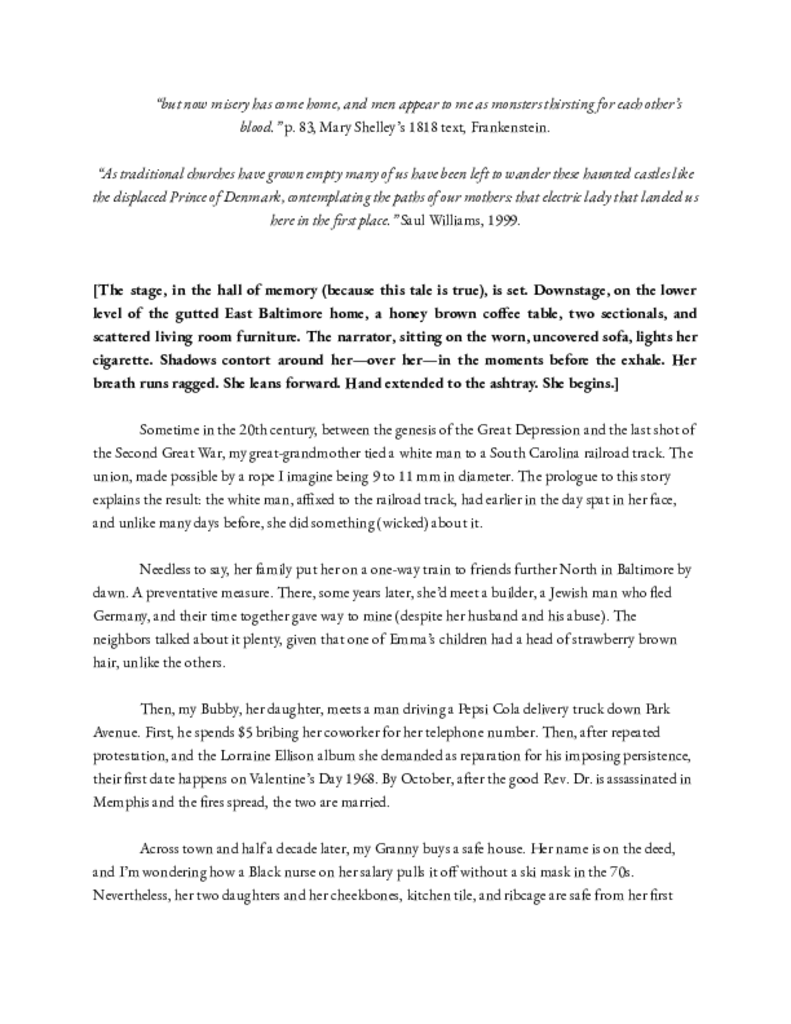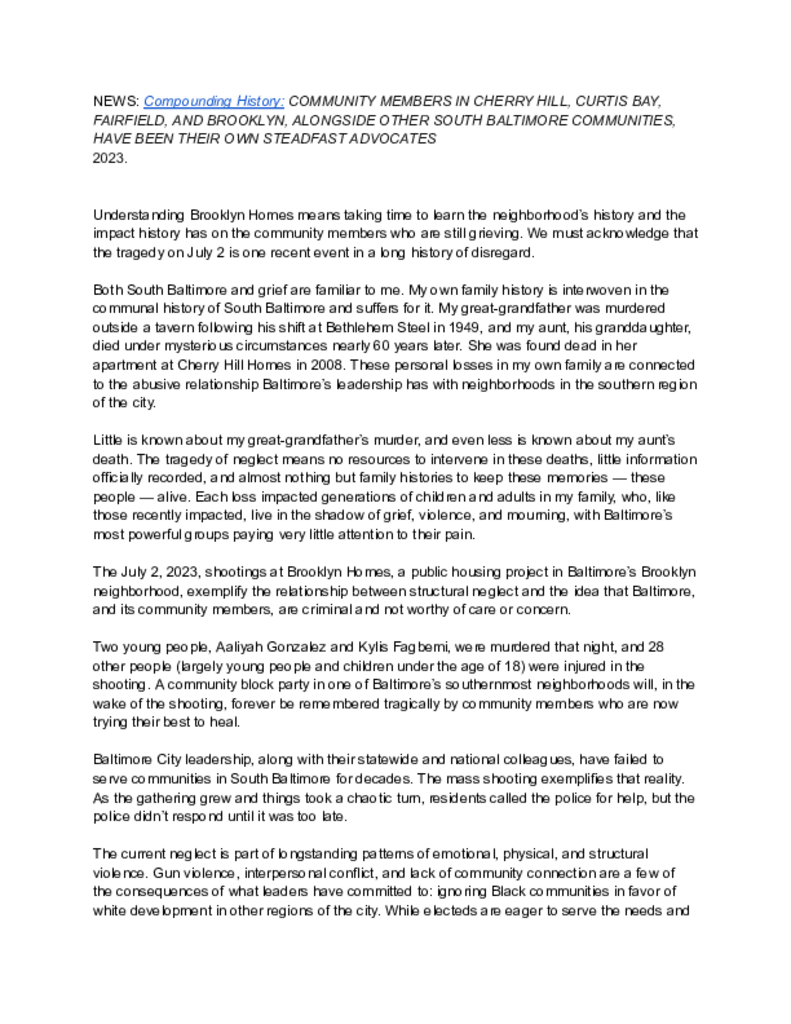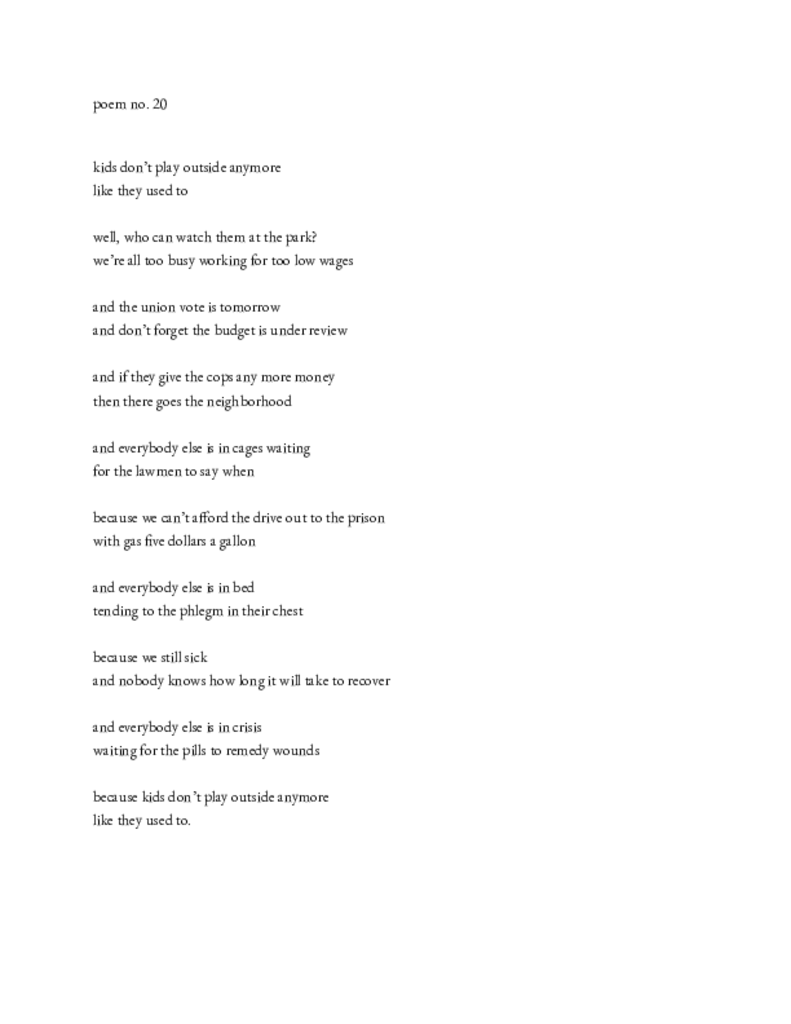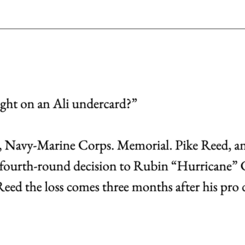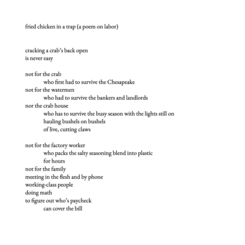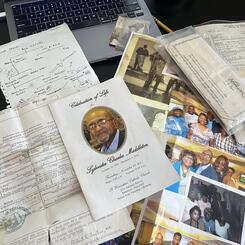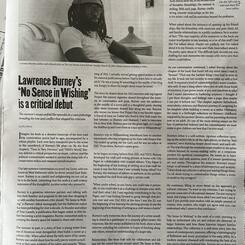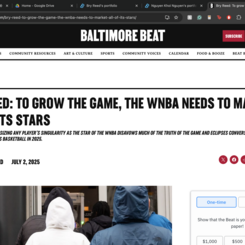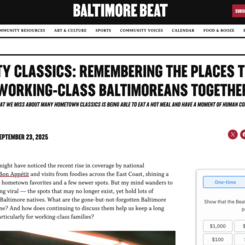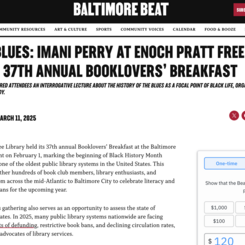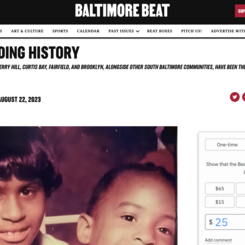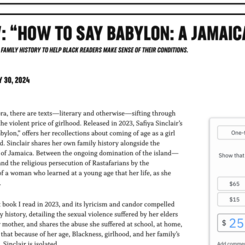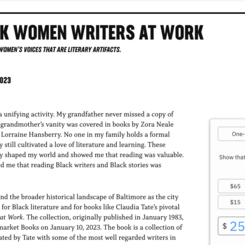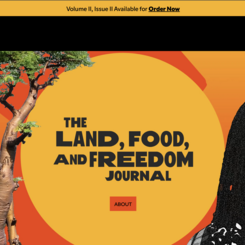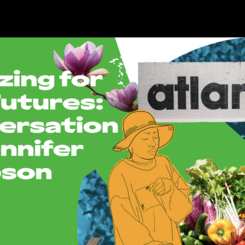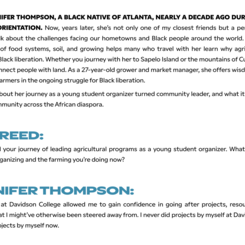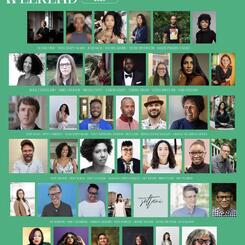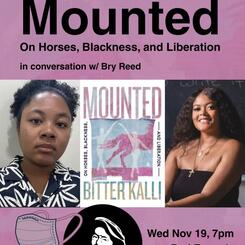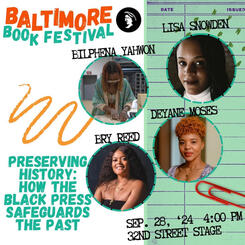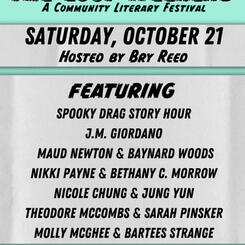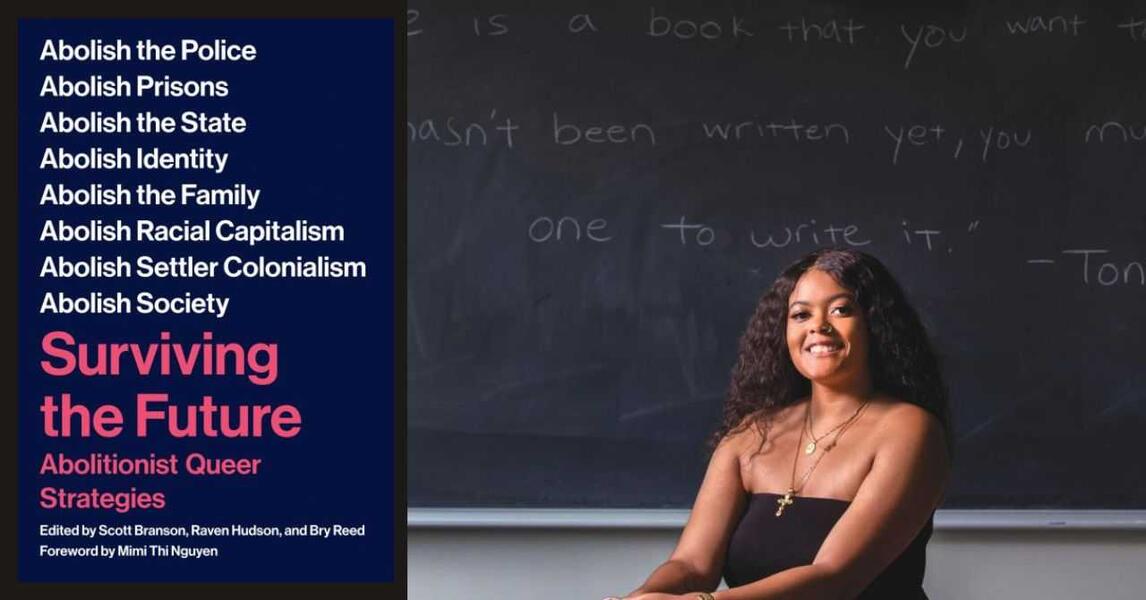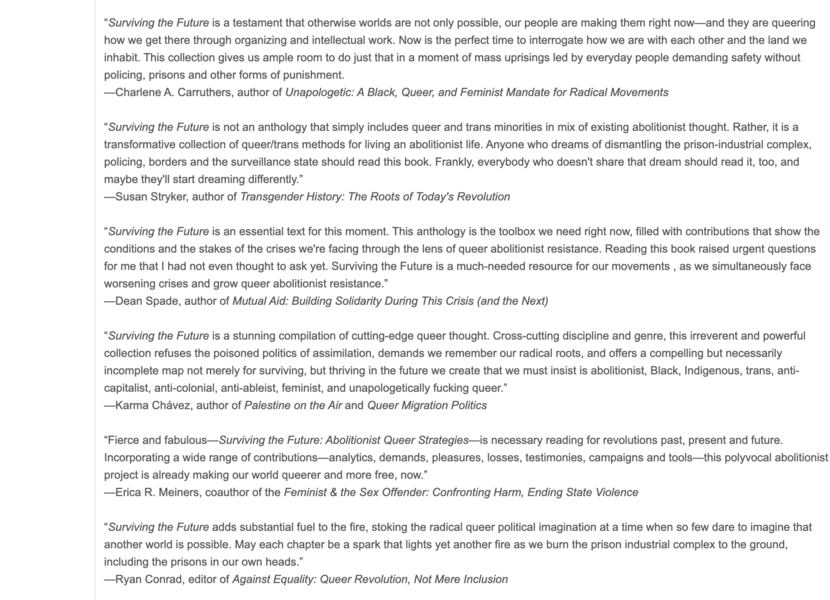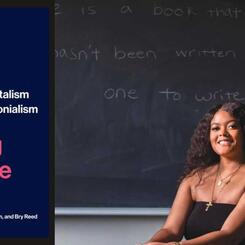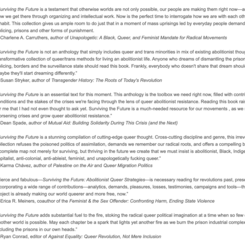Work samples
-
Electric Lady and the Tight Rope
Nonfiction essay written in the style of an on-stage monologue. The narrator, a version of me, sits in the ruins of her family home. In her storytelling, she travels through three generations of family history. Years of scandal and decisions run into the next until she reaches her own life, and it all goes up in smoke.
-
Compounding History, 2023.
A narrative nonfiction essay giving a longer arc of events leading up to the shooting at Brooklyn Homes. Explores personal family histories of living in South Baltimore alongside structural analysis of the conditions of neglect that build the container for violence. The full story is also published online and in print via The Baltimore Beat.
-
poem no. 20
poem no. 20 is a rhythmic rumination on the effects of air pollution, union busting, low wages, and policing on the Curtis Bay community in South Baltimore in the 1940s and the 2020s. The poem contends with the long-term impacts of public health crises and mass incarceration on the ability of families to raise children, take care of each other, and be well. It is to be featured in the first portion of 1927, a memoir in 3 parts.
-
You Know Me Well
You Know Me Well, 2023.
A brief clip of a conversation between Bry Reed and processing archivist and organizer Bilphena Yahwon. The two women discuss local organizing strategy and the origins of Yahwon's work as a processing archivist at The Afro Charities in Baltimore. This clip is a portion of a larger conversation entitled "Discovery" that situates personal commitment to archival practice within the frame of the violence of American imperialism on communities. A transcript of the conversation will be featured in the final portion of 1927, a memoir in 3 parts.
About Bry
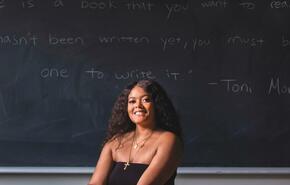
In the belly of the beast, family histories are made up of memories, terrors, and tragedies. With roots in Lowcountry South Carolina, Bry Reed uses creative nonfiction and art criticism to situate herself in time. As an independent scholar and artist, she builds on the postcolonial criticisms from Édouard Glissant and African (diasporic) storytelling traditions. Following Glissant’s intellectual footsteps, she uses essays, poems, and interviews to present five generations of family history.… more
1927, A Memoir in Three Parts.
Instead of accepting the West, specifically the United States, as a cohesive place, I explore my family’s relationship to land, home, and each other and offer a Black otherwise. My work pushes toward Black Diaspora and a non-linear assessment of how poor and working-class families survive.
In my project, 1927, I use narrative—essays, poetry, and genealogies—to create a collage of my family history. This project invites the public into the intimate interior of my family’s memories and explores the politics of relation. The intimate details of our lineage—the interior—are revealed through poems, vignettes, and essays examining the role of colonialism, faith, and love for Black, working-class families living in the United States. The memories explored in this collection will be entry points into one family’s struggles with grief, creativity, and community. My familial interior becomes the chorus, as Saidiya Hartman says in her book Wayward Lives, Beautiful Experiments, where the impact of colonialism and imperialism can be understood for their role in shaping home and relationships.
This project is an intergenerational non-fiction work with creative and scholarly components. The first (titular) section, “1927”, will explore my maternal lineage's journey from the Lowcountry of the Carolinas to Baltimore, Maryland. I seek to explore Hoodoo traditions, grief, and loss to situate histories that shaped the East Baltimore row home where I took my first steps. The second section will center on my conversations with my paternal grandmother and explore my grandparents' 1960s love story we are also exploring the impact of redlining and displacement on a young Black couple. Lastly, I examine my relationships through conversations with friends and mentors.
As a project 1927 is inspired by the Black Radical Tradition and its commitment to questioning Western theorizations of time and place. Beyond Glissant, my project also builds on Toni Morrison’s theorization of memory and meaning. The intergenerational structure of this project is inspired by the work of Black creatives and institutions committed to documenting the intergenerational conversations between Black people. Ultimately, 1927 is a written collage of intimate family histories that grapple with grief, place, and relation and I am eager to share it publicly.
-
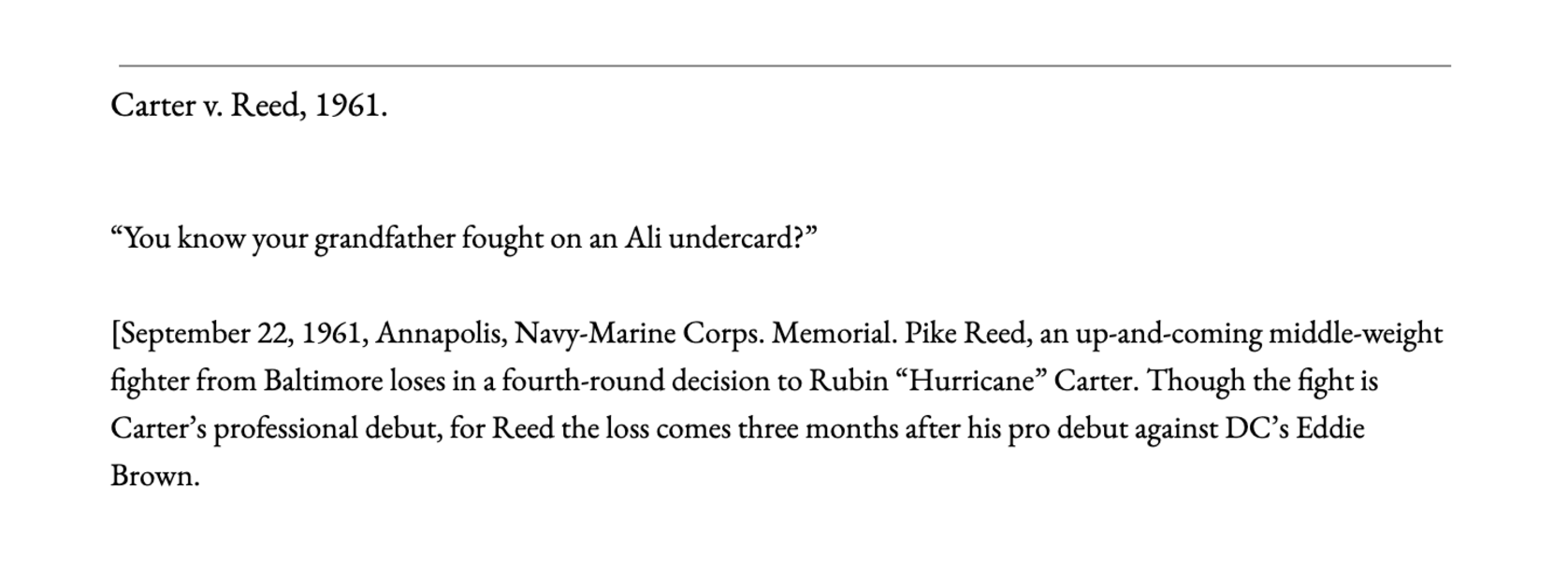 Carter v. Reed, 1961.
Carter v. Reed, 1961.A selected passage from 1927 that details my paternal grandfather's time as a boxer in the Maryland 1960s boxing circuit. Following the style of detailing family memories as stage directions.
-
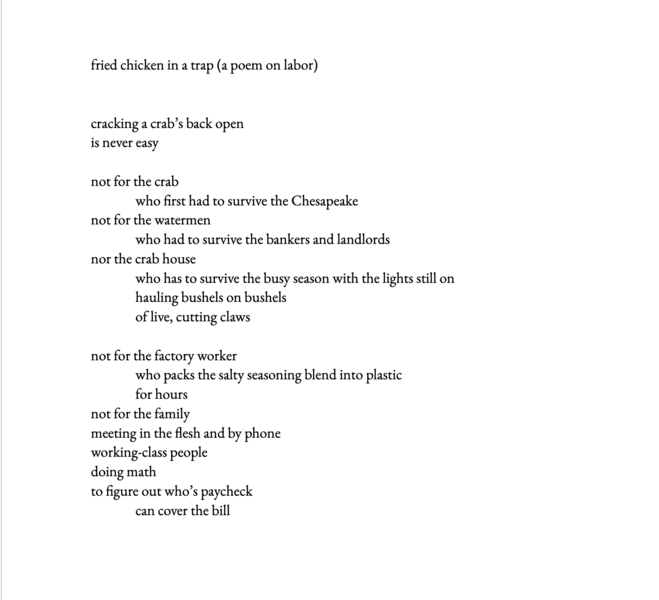 fried chicken in a trap (a poem on labor)
fried chicken in a trap (a poem on labor)When I was a child my maternal grandmother, Granny, told me that the best bait for blue crabs is day old fried chicken. We were driving back over the bridge from Curtis Bay to her red brick rowhome on the east side of the city. This poem is an homage to that memory and all the others about labor, time, and the expense it takes to make family crab feasts happen on working class wages.
-
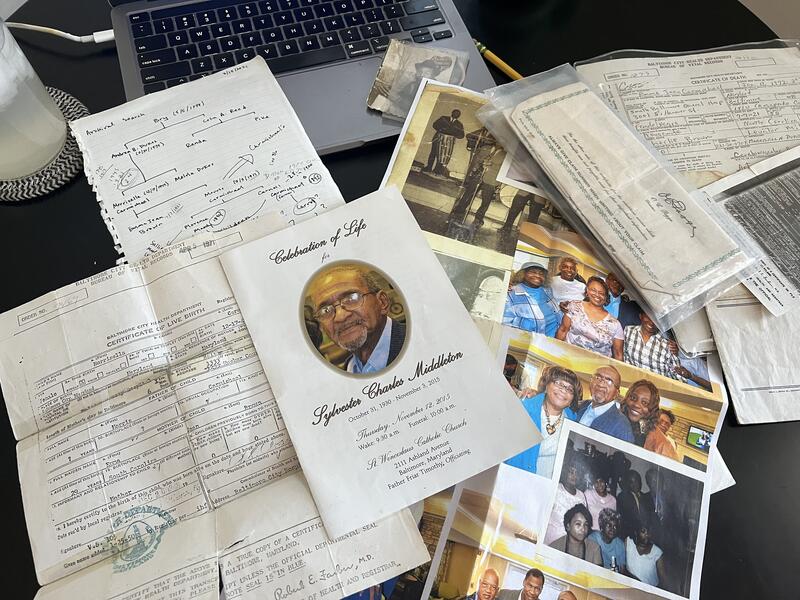 family archives
family archivesMy work in writing a memoir in three parts requires tremendous time and research into my own family lineage. For over five years I've been working on contacting, detailing, and assessing key dates, figures, and places in the timeline of my family's forced migrations from the South (Marion County, South Carolina) to the Chesapeake. This photo show a few of the key family documents and photos that have helped frame my archival study.
The Baltimore Beat
The Baltimore Beat is a Black-led newspaper focused on following the history of the Black press and the spirit of alt-weekly journalism with reporting that focuses on community, questions power structures, and prioritizes thoughtful engagement with readers. I've had the opportunity to work alongside the editorial team at the Baltimore Beat to publish stories connected to literary arts and reporting on pivotal events in Baltimore's contemporary history. My publications can be found at https://baltimorebeat.com/author/bry-reed/.
-
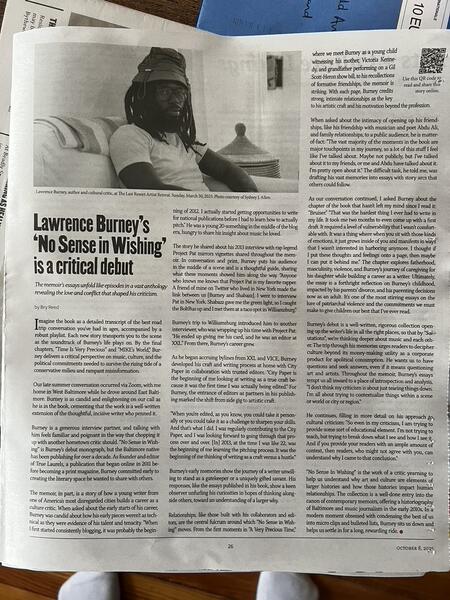 No Sense In Wishing Is A Critical Debut
No Sense In Wishing Is A Critical DebutThe print edition of my recent review of Lawrence Burney's debut memoir, No Sense In Wishing, as featured in The Baltimore Beat.
-
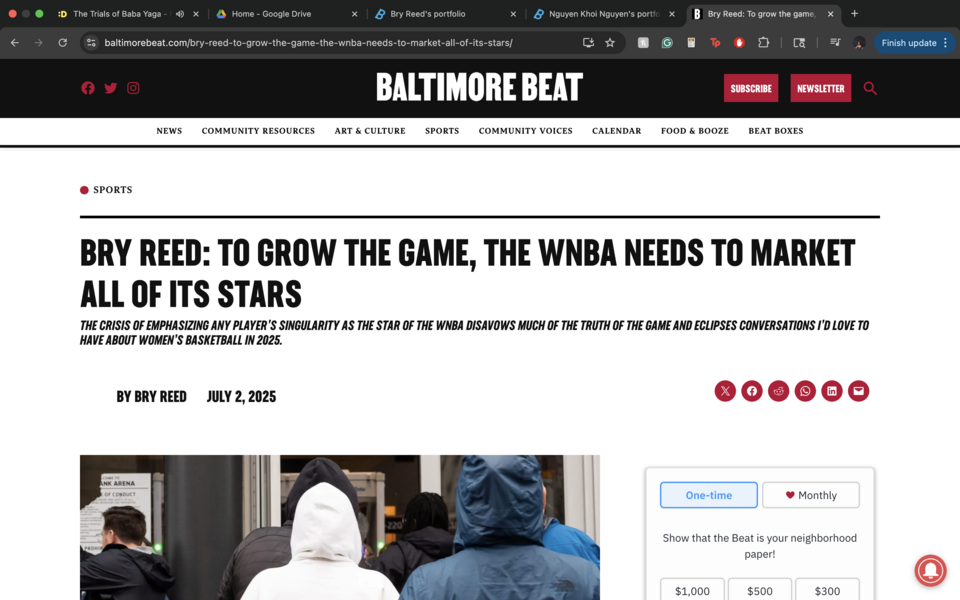 WNBA Stars
WNBA StarsAs a basketball fan, the chance to watch a WNBA up close during the Mystics' home-away-from-home stint at CFG Arena in September 2025 was a treat! Veterans like Brittney Sykes and Shakira Austin came up big for a win in front of their Charm City crowd. The game against the Fever was marked, for many, by the absence of Caitlin Clark as the young guard suffered a series of groin injuries during the season. For me, the game served as an example of why the WNBA's communications and marketing strategy needs to shift to reflect the league-wide depth of talent (especially as five expansion teams are slated to enter the league over the next five years).
-
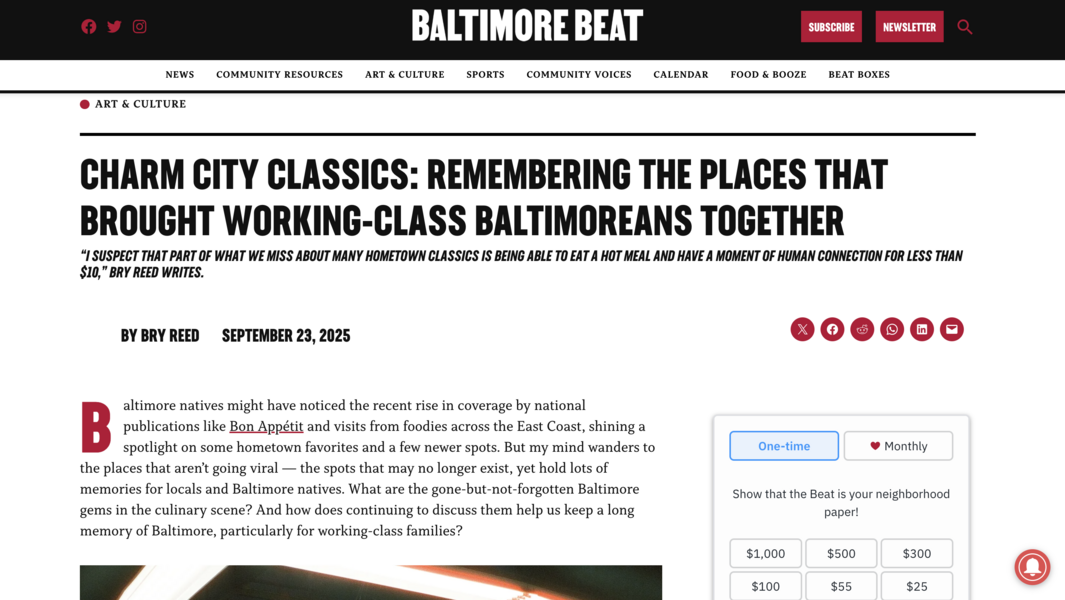 Charm City Classics
Charm City ClassicsIn 2025, for the Baltimore Beat's Food Issue, I interviewed Baltimore artists and culture workers about classic hometown spots that are lost to time, but not forgotten. The essay ends as a reflection on how poor and working-class neighborhoods become ruins.
-
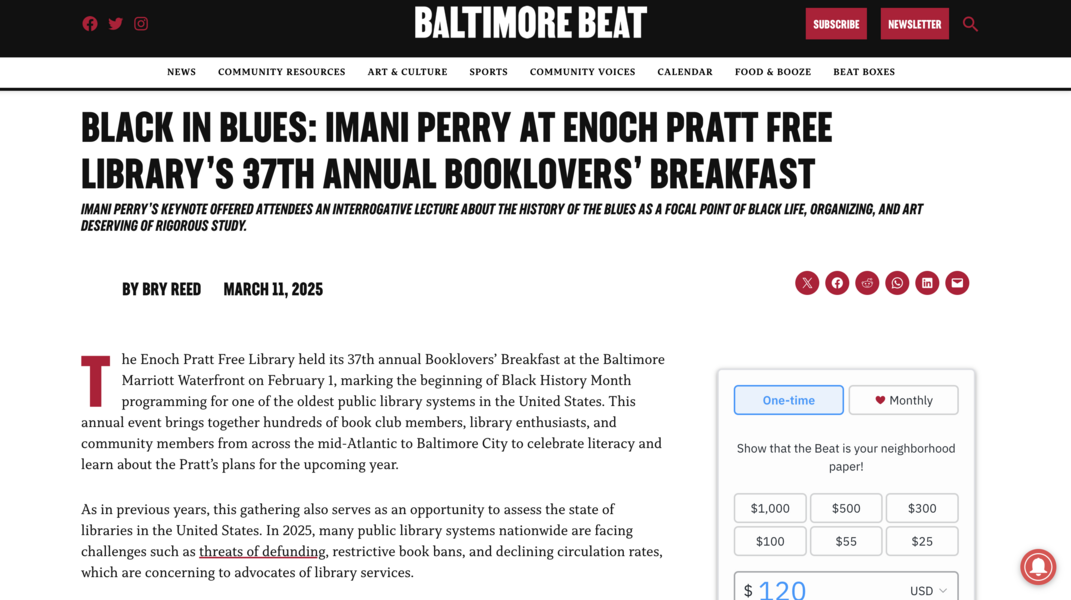 Imani Perry Visits Baltimore
Imani Perry Visits BaltimoreImani Perry's lecture at the 37th Booklovers' Breakfast was a triumph. The scholar of English and Black Studies delivered an engaging talk about histories of education, research, and resistance for Black communities throughout the South. It was a joy to cover this event for the Baltimore Beat in 2025.
-
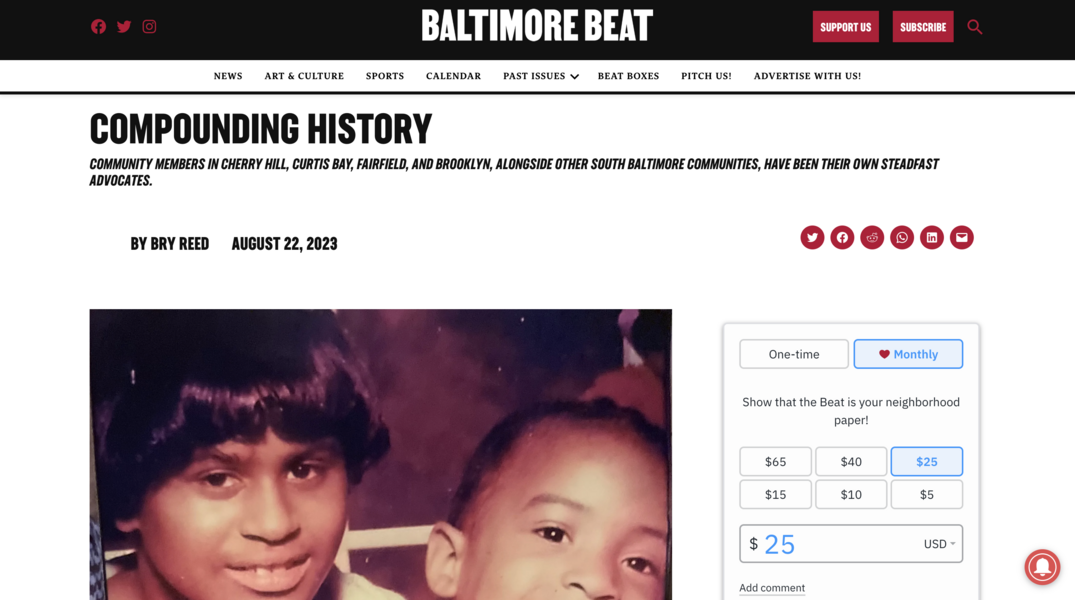 Compounding History, 2023.
Compounding History, 2023.In 2023 in the aftermath of The Brooklyn Homes shooting I published a piece detailing the longer history of neglect facing neighbors in Brooklyn, Curtis Bay, and other neighborhoods throughout South Baltimore. The work blends my family history of murder and untimely death with the wider history of South Baltimore's annexation. The full piece can be read on the Baltimore Beat website.
-
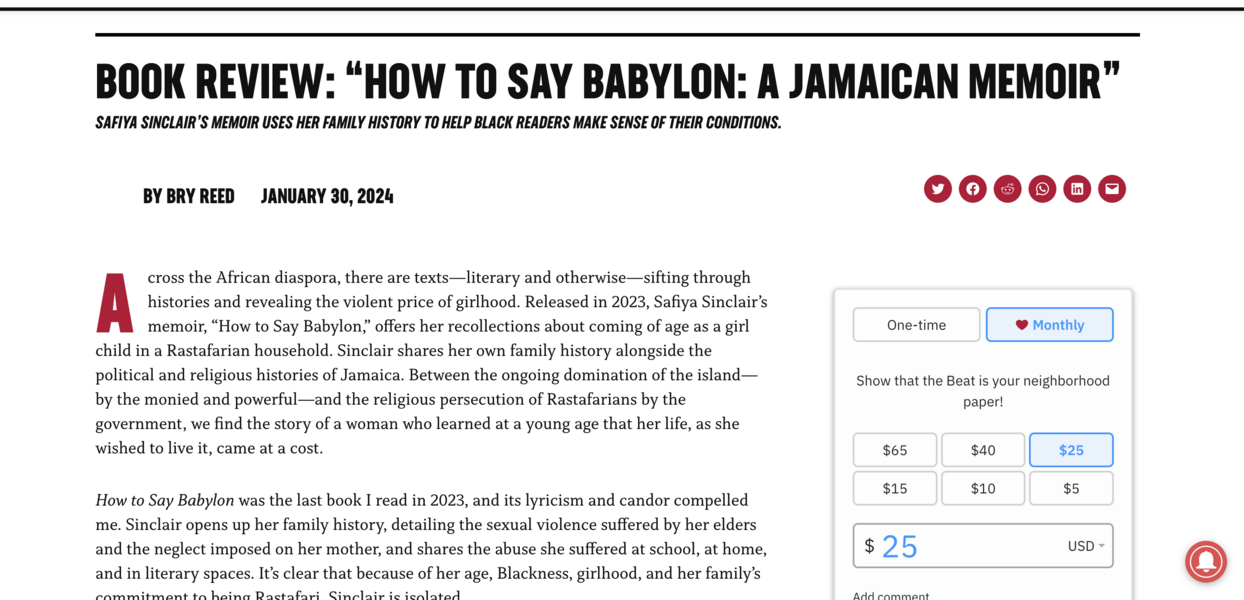 Book Review: How To Say Babylon
Book Review: How To Say BabylonA 2023 review of the memoir "How To Say Babylon" by poet and scholar Safiya Sinclair. Full review can be found on The Baltimore Beat website.
-
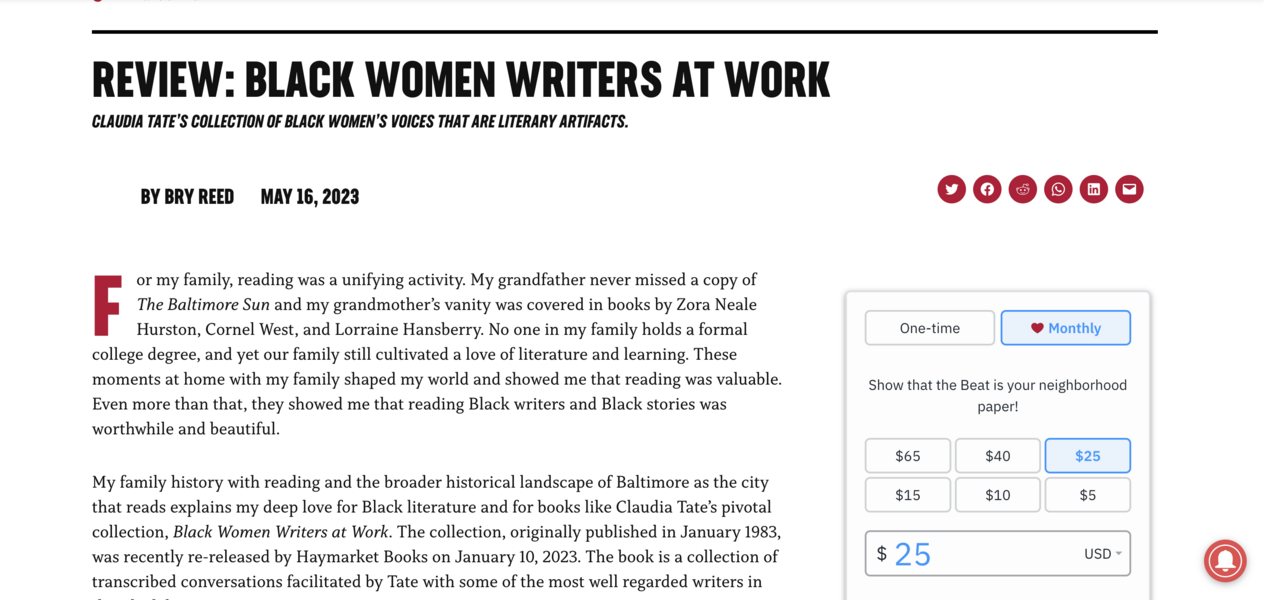 Black Women Writers at Work, 2022.
Black Women Writers at Work, 2022.A 2023 review in honor of the re-release of the 1985 anthology featuring works from Black women writers like Sonia Sanchez, Toni Morrison, Nikki Giovanni, and many others. The full text can be found online and in print from The Baltimore Beat.
Organizing for Black Futures w/ Land, Food, and Freedom Journal
An interview with Jennifer Thompson, Atlanta-based grower and market manager, about the future of Black Southern farmers is featured in Vol. II, Issue II of the Land, Food, and Freedom Journal. Thompson is a brilliant, forward-thinking grower with deep connections to farmers across the African Diaspora.
-
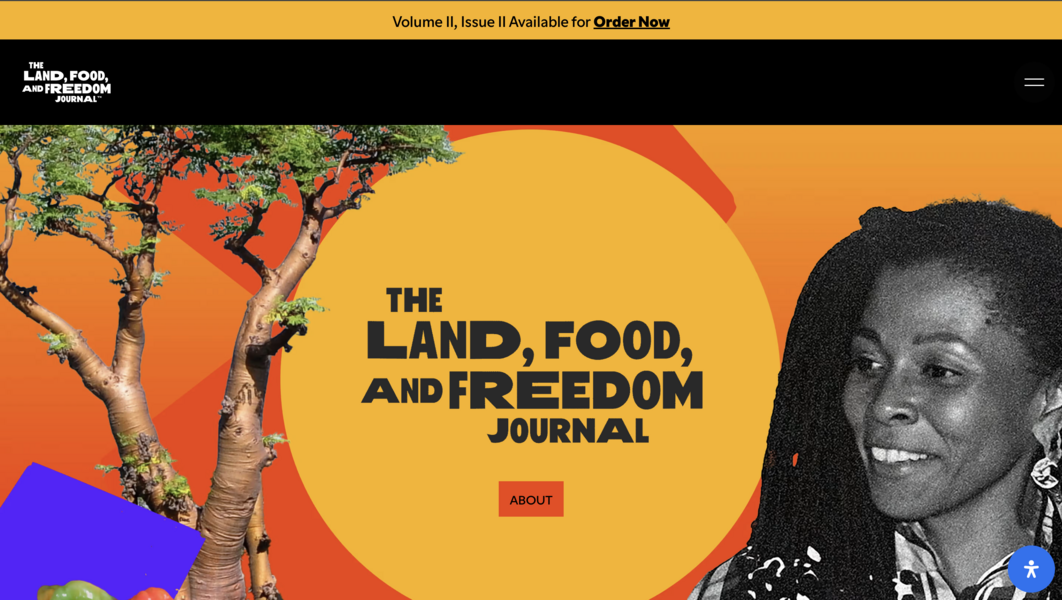 Land, Food, and Freedom Journal
Land, Food, and Freedom Journal -
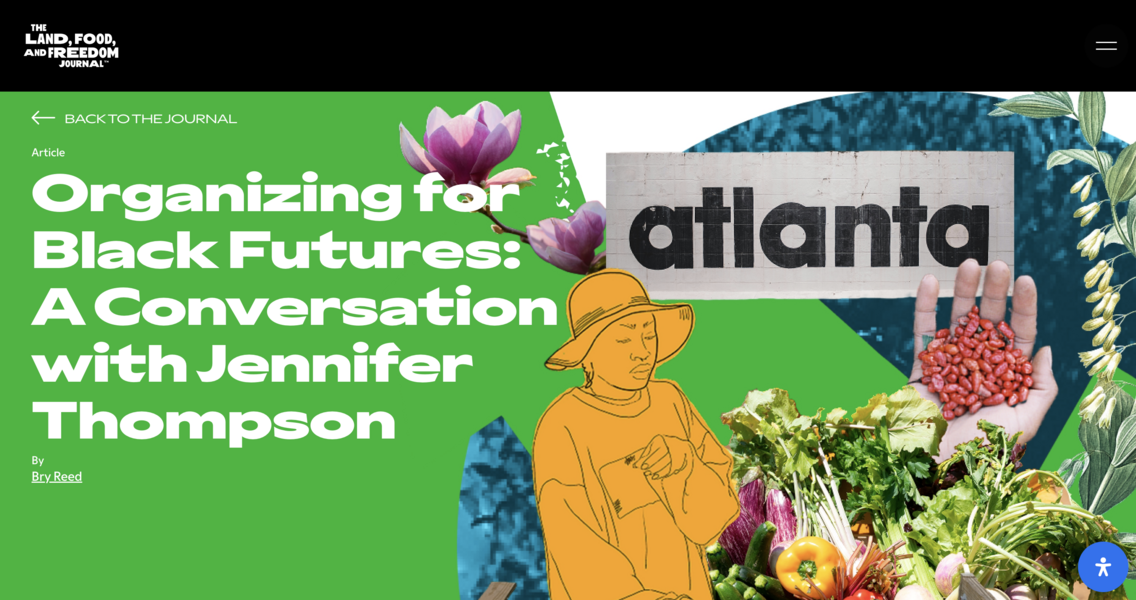 Organizing for Black Futures by Bry Reed
Organizing for Black Futures by Bry ReedThe online landing page for the interview with Jennifer Thompson. https://www.landfoodfreedom.com/post/organizing-for-black-futures-a-conversation-with-jennifer-thompson
-
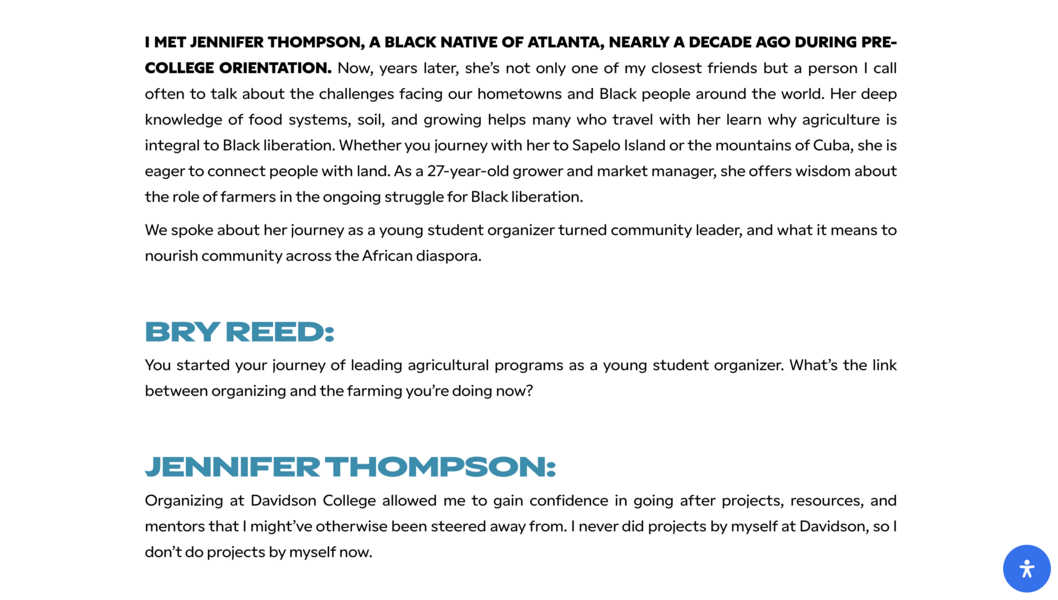 Interview Text Preview
Interview Text Preview
I MET JENNIFER THOMPSON, A BLACK NATIVE OF ATLANTA, NEARLY A DECADE AGO DURING PRE-COLLEGE ORIENTATION. Now, years later, she’s not only one of my closest friends but a person I call often to talk about the challenges facing our hometowns and Black people around the world. Her deep knowledge of food systems, soil, and growing helps many who travel with her learn why agriculture is integral to Black liberation. Whether you journey with her to Sapelo Island or the mountains of Cuba, she is eager to connect people with land. As a 27-year-old grower and market manager, she offers wisdom about the role of farmers in the ongoing struggle for Black liberation.We spoke about her journey as a young student organizer turned community leader, and what it means to nourish community across the African diaspora.
Public Literary Engagement
As a Baltimore native, it is crucial to me to keep the spirit of "The City That Reads" alive! In my artistic and scholarly practice, I adore moments of connection with writers and readers. Moderating public panels, hosting arts events, and interviewing writers is vital to my work's rhythm. My own work and analysis are deepened by collaborating with other brilliant thinkers and avid readers. It's a true joy to honor the tradition of public arts and letters.
-
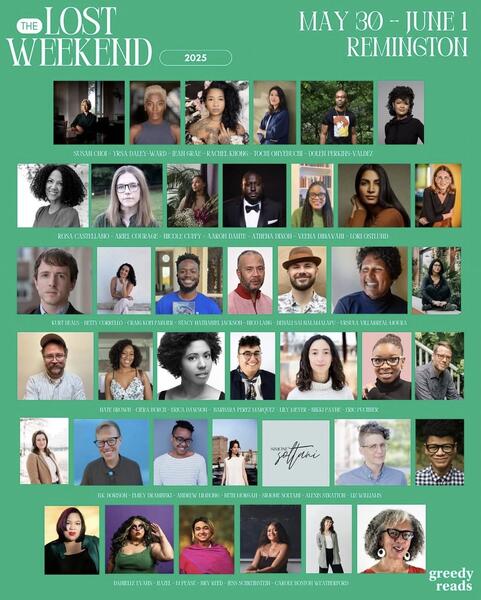 Lost Weekend 2025 @ Greedy Reads
Lost Weekend 2025 @ Greedy ReadsIt's a party every time I get to host literary events with a local independent bookstore in town! It's especially lovely to join the amazing booksellers at Greedy Reads to share great author chats, story times, and more delights with readers. This year I emcee'd the entire lineup for Saturday's festivities and was in conversation with Yrsa Daley-Ward about her novel, The Catch.
-
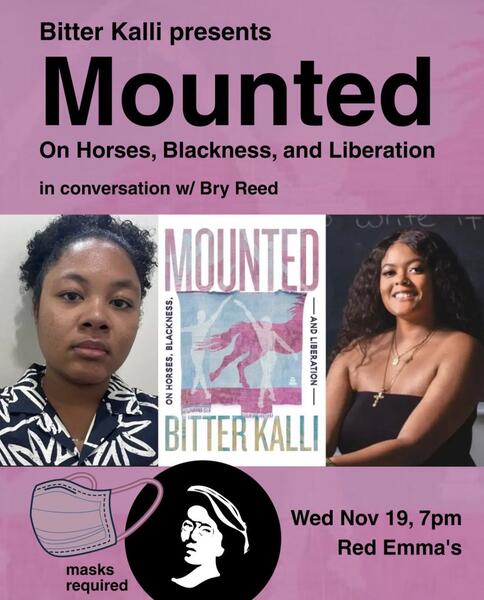 Mounted by Bitter Kalli
Mounted by Bitter KalliHow are the histories of Blackness, liberation, and horses connected? Bitter Kalli outlines the connections between the three subjects while exploring stories of their childhood and years of horseback riding. Our conversation at Red Emma's in November was enlightening and unlocked so many hidden horse memories from my own childhood.
-
People Person, 2022.
In 2022 I was invited to interview best selling author Candice Carty-Williams on the release of her second novel, People Person, at Greedy Reads Remington. We discussed Black literature around the world, the importance of South London to her as an author, the role of conflict in novels, and many other subjects.
-
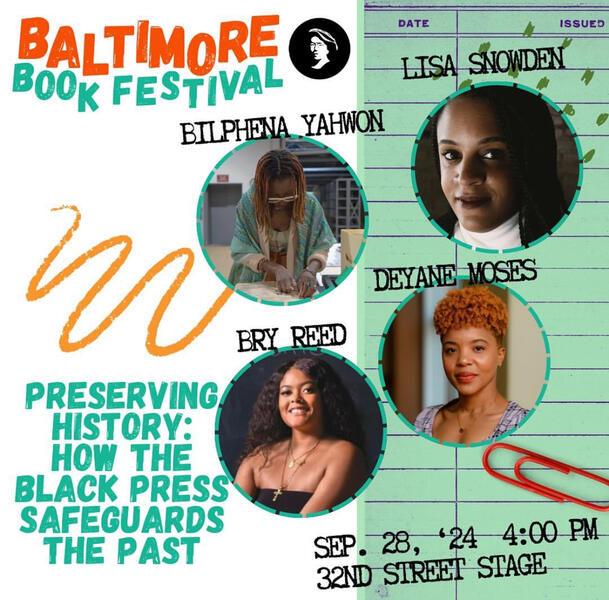 Preserving the Past
Preserving the Past -
The Queendom of Literary Women
In 2024, I was by Carla Du Pree invited to collaborate with the Baltimore arts organization CityLit on one of their panels for the Baltimore Book Festival. The session entitled "The Queendom of Literary Women" explored the practical and logistical barriers to women writers. We discussed the double duty of wage labor, domestic labor, caretaking, and the support needed to sustain the generation of artists to come. The panel featured guests Tyechia Thompson of the Wintergreen Women Writers Collective, Annie Marhefka of Yellow Arrow Publishing, Victoria Kennedy of Zora's Den, Rachel Berg Scherer of Scribente Maternum, and Glory Edim of Well-Red Black Girl.
-
Baldwin 100
In August 2024, I collaborated with Greedy Reads, a Baltimore independent bookstore, to host a public event in honor of James Baldwin's centennial. The event featured Baltimore artists Hess Love, a poet and ethnographer of Afro-Chesapeake history, and Joël Diaz, writer and Director of Programs for The Clifton House, alongside Sam Masters, an organizer and historian. We discussed Baldwin's connection to Maryland's Eastern Shore, his early writing, and his political commitments to working class people and Black communities across the world.
-
The Book of Juju, 2024.
In June 2024, I interviewed author and Hoodoo practitioner Juju Bae, for her debut book release at Greedy Reads Remington. The event was the first stop in Juju's year-long book tour and a foundational interview about the influence of the author's hometown in her work, writing, and study of African(a) Traditional Religions.
-
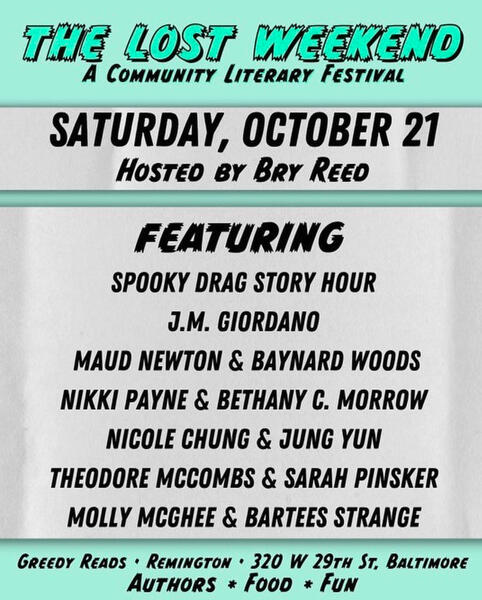 Greedy Reads Lost Weekend 2023
Greedy Reads Lost Weekend 2023In October 2023 I hosted the first day of Greedy Reads Lost Weekend Book Festival. The event featured literary programs for all ages and is a staple for the local Baltimore literary community.
Literary Analysis & Book Club Facilitation
Video samples of my work engaging a public audience virtually with co-facilitators. The goal of the SBG Book Club is to engage virtual communities with rigorous texts in fiction and nonfiction from Black writers across time. I served as a syllabus author, editor, and facilitator from 2020-2023. The video where I break down Mama's Baby, Papa's Maybe gained 7,000 views for my in-depth assessment of Hortense Spillers' work.
-
Discussing Hortense Spillers' Mama's Baby, Papa's Maybe, 2021
A series of virtual book club faciliation with the online collective Smart Brown Girls Book Club. Focused on exploring texts by Black writers and engaging the public in rigorous textual analysis and theoritical framing. The full series can be found on YouTube at https://www.youtube.com/playlist?list=PLc2pibz8smdkkmSBu3VTAjJdx7H1nV677.
-
Secret Lives of Church Ladies by Deesha Philyaw
Leading virtual book club discussion of Deesha Philyaw's short story collection, The Secret Lives of Church Ladies. Together with Dr. Nicole Carter, my co-facilitator, we explore the theme of grief throughout the collection.
-
Parable of the Sower
A video of CJ Jones and I discussing Octavia Butler's Parable of the Sower for SBG Bookclub.
Surviving the Future: An Edited Collection
In 2020 I worked alongside my fellow editors Shuli Branson and Raven Hudson to compile the work of queer writers from around the world about surviving the COVID-19 pandemic, surveillance, policing, gender, and the histories of queer resistance movements (past and present). The collection was published by PM Press and is available in full from local libraries and bookstores.
